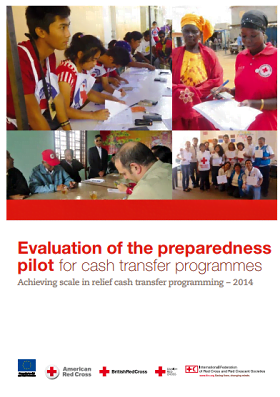Evaluation of the preparedness pilot for cash transfer programmes – Achieving scale in relief cash transfer programming – 2014
It is recognized that cash transfer programming can be effective in supporting populations affected by disasters in a way that maintains dignity and choice for beneficiaries while stimulating local livelihoods, economies and markets. However, the majority of cash transfer programming has been undertaken after the immediate operation response to meet recovery outcomes.
Between May 2012 and December 2013, the International Federation of Red Cross and Red Crescent Societies (IFRC) provided support to four pilot National Societies namely the Philippine Red Cross, the Viet Nam Red Cross Society, the Senegalese Red Cross Society and the Chilean Red Cross through training and coaching to ensure cash transfers and market assessment are embedded into their existing preparedness measures and contingency planning. This was done to ensure that during an operation with scalable cash transfer component, the programme could be rapidly implemented to meet the immediate or relief needs of the affected population.
The findings of the evaluation suggest that the Viet Nam Red Cross Society and the Philippine Red Cross have demonstrated a capacity to scale up cash transfer programming in relief. While the Senegalese Red Cross Society and the Chilean Red Cross have the basis to be able to scale up cash transfer programming relief response to future disasters.
It is notable that all four National Societies’ leadership accepted and supported cash transfer programming as a form of intervention in relief. This reflects a marked change of thinking and practice compared to before the pilot was implemented.



